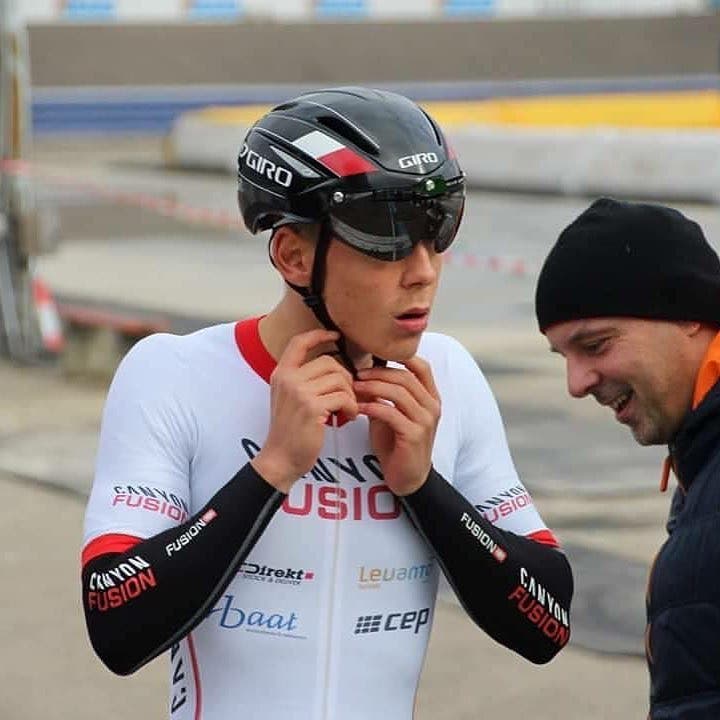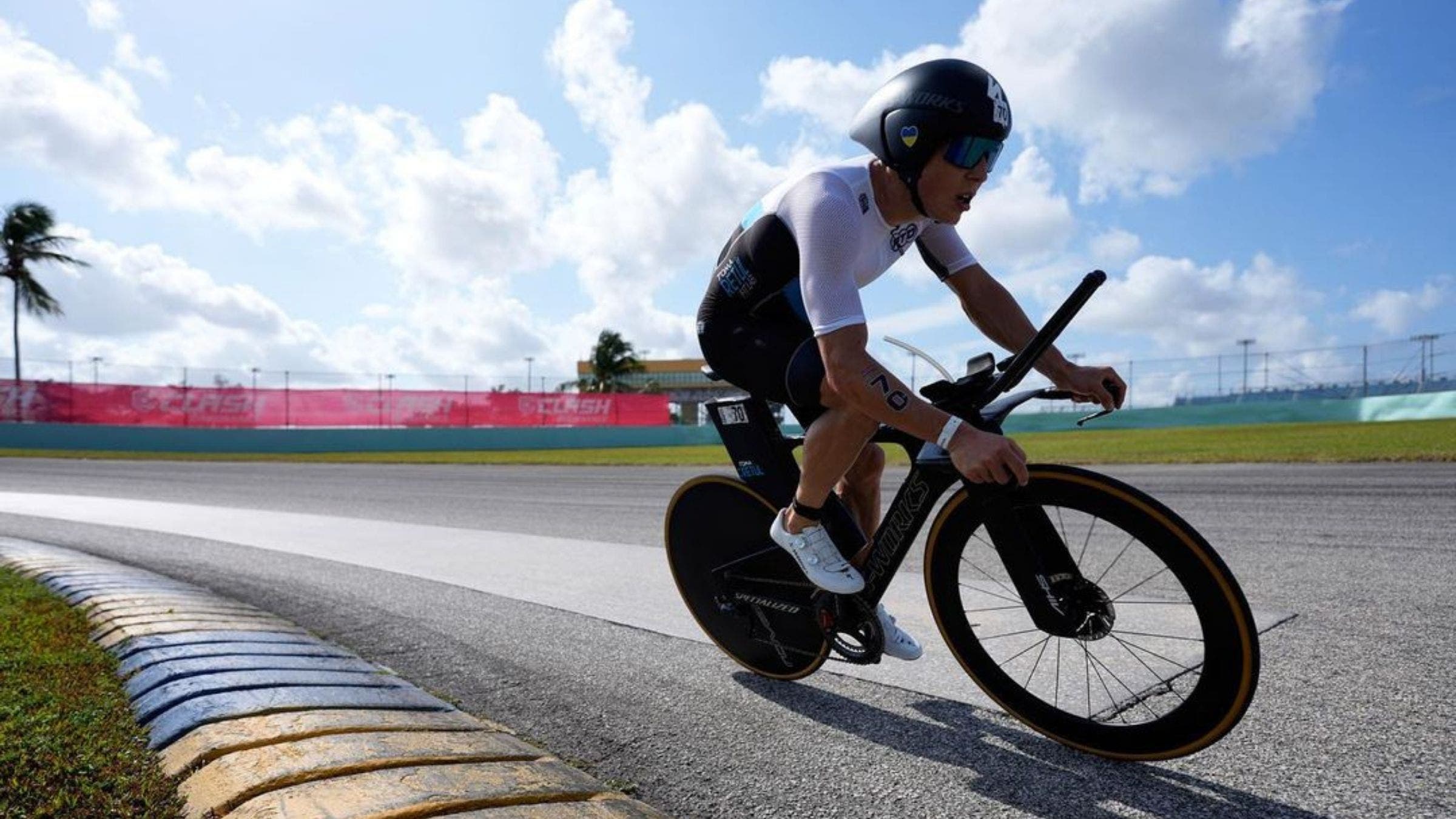The Man Behind The Most Memorable Post-Race Speeches in Tri

(Photo: CLASH Miami)
“What a day! What a day! I thought: ‘Come on baby, bring it home! This one is yours and you’re not going to lose it!’ Top sport is the most beautiful thing that exists. But triathlon has a special place in my heart.”
Those are the words of Netherlands’ Youri Keulen after his solitary victory in World Triathlon racing—the 2019 ETU Indoor Triathlon European Cup in 2019 in Lievin, France.
In the B final.
There are reasons—some of which we’ll get to—that might explain why Keulen’s short-course career hasn’t hit the heights he’s craved. At least not yet. But even when he’s not on a post-race high, the enthusiasm is infectious, the candor refreshing.
“When I give interviews, it’s straight from the heart… it’s just how I feel,” said the 23-year-old from his base in Girona, having returned from Clash Miami, where both his performance and post-race interview piqued interest in the larger tri community.
Wearing his heart on his helmet for Ukraine
A breakthrough fourth-place in a world-class field, scything through the opposition with a second-best run split of 55 minutes, 28 seconds for 10.5 miles, gave the Dutchman every right to be emotional, but this time his finish-line outpouring reached far beyond sport.
Keulen was referring to racing with the yellow and blue colors of the besieged eastern European country, and his trusted mentor Kosta Poltavets, who plays an integral role in his coaching team. It was an effort to make sense of the relative futility of triathlon in the context of conflict.
Reflecting back on those comments, he now says: “I was looking back at my Instagram last week, which I usually never do, and noticed that 2-3 weeks before the race I hadn’t posted anything. I felt there was something different in the world, and who cares about me doing track sessions? I care about it, Kosta cares about it, and the people around me care about it. That’s it.
“We spoke about my statement [after Clash Miami] and he said: ‘Youri, it was really dark in the Netherlands, but it was still possible to have sunshine in our house because of your helmet and the things you said.’ I hope that people who watched from the Ukraine had the same feeling, and if that’s the case I’m happy, and I’ve done my job.
“But Kosta also told me: ‘If you think I’m sad, you’re not going to help me. If you think I’m strong you’re helping me. Race with your heart and then I know it’s for me and all the other guys, that’s what helping is. You made a statement and now it’s done. You made a lot of people happy with it and that’s the best thing you athletes can do.’
Building his coaching dream team
If Coach Poltavets is steeped in endurance-sport knowledge, it also extends to the rest of Keulen’s coaching and management trio: Carlos Prieto—Javier Gomez’s long-time former coach—and ex-Rabobank professional rider, Kai Reus. They are at the heart of an overhaul that has seen Keulen strike out on his own after being with the Dutch tri federation for eight years. It’s the type of decision that just isn’t done in Holland.
“By Dutch principles, I am doing the most scary thing possible,” he said, using a soccer analogy to explain the mentality. “For 50 years, they’ve played the same football. Every tournament, the same formation: 4-3-3. It’s the Dutch school, yes, but look at the Norwegians… it’s Moneyball, think about it differently!”
With the national federation dedicated to the Olympics and focused exclusively on short-course racing, and with so few training independently, perhaps it shouldn’t come as a surprise that there is just one Dutch triathlete in the top 100 of the PTO rankings: Evert Scheltinga, ranked #100 as of this writing. Keulen plans to change that.
“I don’t really mind if I’m the first or last doing long distances, as long as I can look back when I have kids and say: ‘Daddy had the best time of his life!’ It’s not really appreciated by the federation—there’s no budget for long distance. It’s always Olympics, Olympics, Olympics, and then the federation smokes them and they’re never going to be back in the sport.”
It’s clear that there’s no love lost between Keulen and the setup he finally cut ties with in October—having first been recruited through its talent program thanks to a running pedigree that saw him as a three-time national 800m champion in his teens.
“I had no swimming experience at all. Nothing,” he said. “The federation said I could learn the bike, but didn’t know whether they could teach me to swim. They said: ‘If you want to invest in swimming, we want to invest in you.’ Well, I did. I kept investing and qualified for the 2016 junior Worlds in Cozumel.”

Yet, while Keulen improved in the water, he was rarely threatening a podium outside home races. Something wasn’t right. “There was so much pressure. We were 15 athletes, and all 15 did the same program, only based on endurance. In a race my body was never in the state of going through lactate and all the alarms went off. They completely trained me wrong. Let me race ITU now and I’ll have different results.”
Under the watchful eye of Poltavets and Prieto—who helped take Javier Gomez to a record-equaling five world titles—the training has been turned on its head, and given him the confidence that it’ll pay dividends at all distances.
“Now I’m doing intensity. There are still base miles, but with a lot of accelerations. It’s completely changed my lactate curve and endurance ability. My heart rate is now 15-20 beats lower at the same pace or watts.”
Prieto sets the training, with Poltavets—who has coached world-champion Dutch speedskaters—overlooking the data and providing insights. Then there’s Reus, the 2003 world junior road race champion, who was first met as a roommate in Namibia.
“There was this 34-year-old cyclist who’d seen it all, and I thought this is going to be a boring training camp. We connected. I told him I wanted to leave the federation, but didn’t know how. He said: ‘Youri, I want to commit to you, and in two years things will be different.'”
So, what role does Reus play? “First, he’s my best mate. I talk about everything with him. He guides me through his experience, and he’s seen some nasty things. He was in a coma for 10 days with a brain injury after a crash and had to rebuild himself into a cyclist.”
It’s a support network that works in synergy. “If I want to change something with my training, unless they all agree, we don’t change anything—and they always agree. The most important thing is all these guys are fascinated about triathlon and in trying to make me a better athlete.”
The other part of the puzzle is continuing to improve the swim, and for that it helps to have someone on deck. Having become the latest professional triathlete to move to Girona, one of Keulen’s first excursions was to the public pool to find a swim coach. That was his introduction to Joan Gomilia. “I said: ‘Who is the guy who can teach me how to swim?!’ and was introduced to a 23-year-old studying sports science who is maybe not the most experienced, but is so passionate. On the weekend of Clash Miami, his dad turned 60, but he took the iPad to the restaurant so he could watch my race!”
Moving up
Another pillar is the financing, made more pressing now that Keulen is stripped of federation support. Showing commendable maturity for a young athlete, it’s a project he’s been working on for the past decade, and as part of Stichting Return (the Return Foundation), he is among a clutch of ambitious sports performers supported by a network of local firms who have committed to invest in his talent until 2028.

After the fourth-place finish in Miami, there’s the possibility both appearance money and prize money can be added to the coffers too. Invitations from other race organizers have come forth, and another decent result should see Keulen in the top 50 of the PTO rankings soon. Yet while non-drafting racing holds appeal, Paris 2024 is not being ruled out—although it won’t be through chasing qualifying points all over the world.
“You can see from the last Olympics that the guys that went everywhere to race couldn’t compete. I always want to race to my maximum potential. I need to race four-to-five World Cups, a couple of World Series, have a really good result, and I’ll be there. If I’m not there then, it’s probably not for me.”
If he does make it at whatever distance, it’s likely that the run leg will prove decisive. “I was always superfast. I kept to 800m, and was quite good at 400m as well, and sprinting is always a weapon I have. When I go for the finish line I am the most confident in the sprint out of all of them. When I have 800m to go in a race I say: ‘Come on Youri, you did this so many times.’” And if anyone can stay positive and give a finish chute pep talk, it’s Youri Keulen.